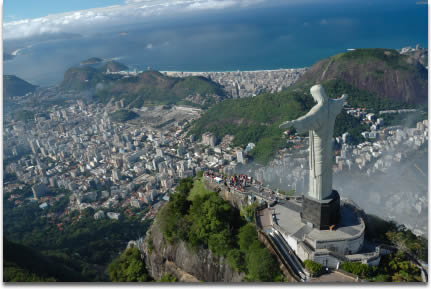
By Gaylee Coverston
Brazil has always been home to a richly spiritual society. The natives of Brazil had many strong faith-filled customs. Then, Catholicism came to Brazil in the 1500’s with its European settlers. They built churches and brought religious leaders to convert natives, who retained many of their own customs, and to continue and foster religious devotion among colonists. As slaves from Africa came to Brazil, they brought their own beliefs and traditions. The Roman Catholic Church had a steady and growing presence all through the countries birth and developing years. In this melting pot of ideas, a convergence of African beliefs. Native Brazilian customs and Portuguese Catholicism created a diverse array of syncretistic practices within the all-encompassing concept of Brazilian Catholicism. This unique unity aided the Roman Catholic Church during Brazil’s development. In the 1800’s, Catholicism became the official religion of Brazil, heavily involving itself in government activities. However, with independence from the Portuguese Monarchy, separation between church and state grew as an ideal and democratic leanings prevailed. In the 1891, the first Brazilian Republic Constitution declared no official religion and put in place separation between church and state. Subsequent constitutions gradually advanced religious freedom and freedom of conscience, although the Catholic Church continued to have a strong presence and influence well into the 1970s. Currently, Brazil has one of the most welcoming and open laws and regulations regarding religious denominations and the free practice of religion itself. Its people also maintain religious harmony in most respects, making Brazil one of the most religiously diverse and religiously free countries in the world. However, religious persecution does exist. Recently religious intolerance has increased.
According to resent census records, approximately 90% of Brazil’s population subscribe to one religious denomination or another. In a country of more than 190 million people, the 2010 census showed that 64.6 % claim to belong to the Catholic Church, more than any other country. Protestant religions, broadly defined as most other Christian religions, claim 22.2% (i.e. Protestant, Pentecostal, Methodist, Baptist, Lutheran, Episcopal). However, in accordance with Brazilian Census Categories, this excludes Mormons and Jehovah’s Witnesses. Other religions, including Afro-Brazilian faiths such as Candomble and Umbanda, Spiritist, and global religions such as Islam, Buddhism, Jews, Mormons and Jehovah’s Witnesses, calculate 5.2% of the population and those with no religious affiliation, including agnostics and atheists, claim 8%.
Census records also indicate that Brazil’s population has become increasingly urban, almost 85% of the population now reside in cities. Those still in the rural areas tend to affiliate more with the Catholic Church, However, just as the population is increasingly urban so are religious trends becoming more urban in nature and also more diverse. Brazilians in urban areas have begun to turn toward other religions, causing a drop in the percentage of Catholics and an increase in other religions, both Christian and Non-Christian. Religion portrays an insightful part of the culture and customs of a nation, and the dynamics of Brazil’s religiosity testifies to its depth as a country.